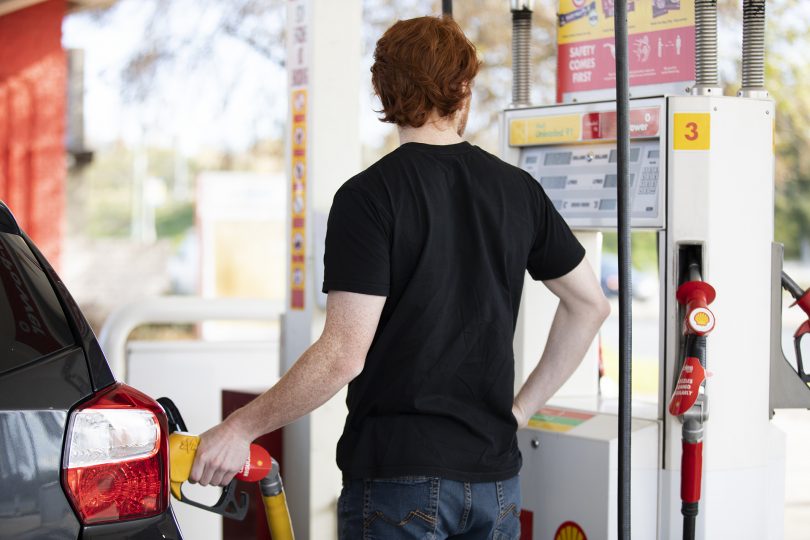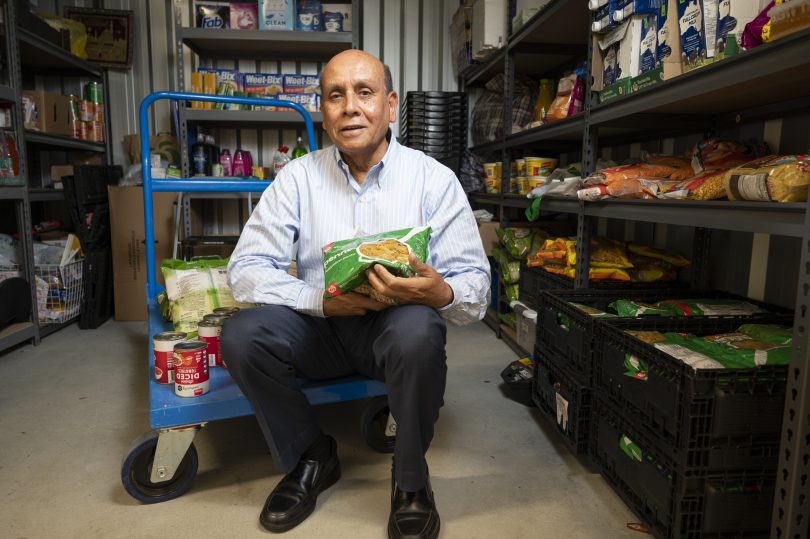
When petrol gets more expensive, it’s the first domino of many to fall. Photo: Michelle Kroll.
It’s no secret petrol prices are at record highs and groceries are following in these unwelcome footsteps.
For most Canberrans who are already feeling the pinch at the bowser or the till, it’s a simple case of cutting back on life’s luxuries – eating out a little less, watching Netflix at home instead of going out to the movies or cutting back on holidays.
That’s not the case for the estimated 38,000 Canberrans who live below the poverty line, nor for the many more who are living paycheck to paycheck and are already being forced into making difficult decisions.
Like choosing whether to put food on the table or whether to fuel in the car. Or whether to pay rent that week or for healthcare.
ACT Council of Social Service (ACTCOSS) CEO Dr Emma Campbell said she’s heard heartbreaking stories of parents missing meals because they want food on the table for their children instead.
In Canberra, a city still heavily reliant on petrol vehicles for transportation, the sting is particularly acute for those who may have no option but to use their car to get themselves and their families around.
“Many people on low incomes are shift workers, which means public transport may not be an option,” Dr Campbell said.
It’s not just fuel prices either – which are a bit like the final nail in the coffin for many – but the fact that everything else is getting more expensive, too.
According to ACTCOSS’ cost of living report from August last year, ACT’s electricity prices have increased by almost 28 per cent, gas by 26 per cent, health by 18.6 per cent and housing by 16 per cent.
“If you’re spending all your money on essentials and the cost of essentials goes up, you’re stuck,” Dr Campbell stated.

Mohammed Ali said there is a growing underclass in Canberra who are trying hard just to make ends meet. Photo: ACT Government.
Services delivering groceries and more to those struggling to get are also feeling the pinch, too.
Newly-minted Canberra Citizen of the Year and founder of HelpingACT Mohammed Ali said he and other volunteers have felt the pinch when purchasing groceries for those who require them in the community and when filling up the charity’s van.
A few months ago, the team could purchase a package of groceries for $50. Now, it’s costing them upwards of $90 for the same, or a similar shop – and that’s a meat-free package.
To Mr Ali it is clear there is an “underclass” of Canberrans and it’s currently a growing group, due to pandemic’s impacts on people’s lives.
“It’s not necessarily that both partners [in a family] are jobless … but still they are trying very hard to make ends meet,” Mr Ali explained.
Dr Campbell said the important thing to consider is just how many dominoes start to fall when a necessity like petrol becomes more expensive.
“You can see in that example there are two issues at play. One is that community services will experience an increase in demand because people’s lives are getting more expensive, and the other is that the organisations themselves are incurring much higher costs,” she explained.
Dr Campbell said a simple way the local government could step in would be slashing the costs of public transport, or even making it free, so people can be less reliant on their cars.
But for now, the ACT Government won’t be making any changes to the price of public transport as other jurisdictions, such as New Zealand, have indicated they will do.
Chief Minister Andrew Barr said yesterday he believed the ACT’s current prices to be “very competitive when compared with other cities’ and it wasn’t something on the government’s agenda in the short-term.
However, he flagged that the government would re-examine its range of concessions available to low-income households before its next budget. Dr Campbell welcomed initiatives such as rebates on drivers’ licences and car registration fees.
A Legislative Assembly inquiry into fuel prices in 2019 found the ACT Government has very few levers at its disposal regarding fuel prices.
Mr Barr said if the Federal Government was to step in and cut its fuel excise, for example, it needed to do something significant as “saving one to two cents a litre” would not really make a difference to people’s hip-pockets.
He also called on the government to support the transition to electric vehicles so the country would be better insulated from foreign oil price shocks.













